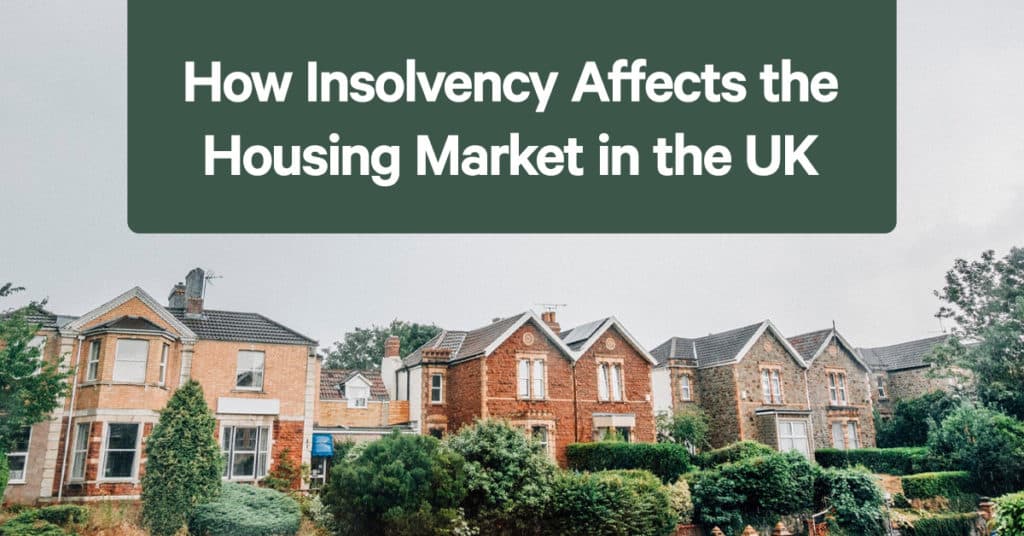Insolvency is a term that resonates deeply in various sectors, particularly in the housing market. As businesses and individuals face financial difficulties, the implications of insolvency ripple through the economy, influencing property prices, availability, and consumer confidence. This blog will explore how insolvency affects the housing market in the UK, providing insights into its impact on property values, buyer sentiment, and the overall market dynamics.
Understanding insolvency
Insolvency occurs when an individual or organisation cannot pay their debts as they fall due. In the UK, this can appear in various forms, including personal bankruptcy, company liquidation, or voluntary arrangements. While insolvency is often associated with business failures, its effects reach far beyond the boardroom and can significantly impact the housing market.
The link between insolvency and housing
When insolvency affects individuals or businesses, the consequences can affect the housing market. For instance, if a large number of homeowners face insolvency, it can lead to an increase in property repossessions. As more homes enter the market due to repossession, the supply rises, often resulting in downward pressure on property prices.
Repossession and its impact on property values
The impact of insolvency on the housing market is evident through several key factors that can change the landscape. Understanding these consequences helps illustrate how financial distress among homeowners can lead to broader market implications, including increased repossessions and declining property prices.
-
Increase in repossessions
One of the most direct ways insolvency affects the housing market is through increased repossessions. When homeowners cannot meet mortgage repayments lenders may resort to repossession to recover their debts. This influx of repossessed properties can saturate the housing market, leading to a surplus of homes for sale.
-
Declining property prices
As supply increases due to repossessions, property prices may begin to decline. This decrease can affect not only the value of repossessed homes but also the overall property market. Homeowners in areas with high levels of repossession may find their property values diminish, potentially leading to negative equity situations where the mortgage owed exceeds the property’s value. That creates a cycle of financial distress that can add to the insolvency trend.
Consumer confidence and housing market activity
The effects of insolvency go beyond just financial metrics; they influence consumer behaviour and market dynamics. Key factors such as the erosion of buyer sentiment and delayed purchases highlight how insolvency can lead to a slowdown in housing market activity, impacting both sellers and potential buyers alike.
-
Erosion of buyer sentiment
Insolvency affects the housing market by eroding consumer confidence. When individuals see reports of rising insolvencies and repossessions, they may be hesitant to make big financial commitments, such as purchasing a home. A lack of consumer confidence can lead to reduced buyer activity, further worsening the imbalance between supply and demand.
-
Delayed purchases and market slowdown
As potential buyers adopt a wait-and-see approach, the housing market may experience a slowdown. This reduced activity can lead to longer selling times and increased competition among sellers, further impacting property prices. The overall health of the housing market is intricately tied to consumer sentiment, making it important for stakeholders to closely monitor the effects of insolvency.
The role of government and financial institutions
Insolvency’s effects on the housing market often prompt responses from government entities and financial institutions. These responses, ranging from government interventions to changes in lending policies, play a vital role in shaping market stability and influencing the overall health of the housing sector.
-
Government interventions
In response to the negative impacts of insolvency on the housing market, the UK government may implement measures to mitigate these effects. Initiatives such as mortgage relief programmes or temporary bans on repossessions can provide much-needed support to struggling homeowners. By stabilising the housing market, these measures aim to maintain property values and prevent a broader economic crisis.
-
Financial institution policies
Lenders also play an essential role in how insolvency affects the housing market. Many financial institutions may tighten lending criteria during periods of rising insolvency, making it more challenging for potential buyers to secure mortgages. This tightening can lead to decreased home sales and further downward pressure on property prices, creating a feedback loop of financial distress.
Long-term implications for the housing market
The impact of insolvency on the housing market can lead to substantial long-term changes in consumer preferences and behaviours. As financial uncertainties shape buyer decisions, shifts in demand for affordable housing and increased reliance on rental properties become clear, prompting stakeholders to adapt to the changing conditions.
-
Shifts in demand
As insolvency affects the housing market, it can lead to long-term shifts in demand. For example, buyers may increasingly seek affordable housing options in more stable areas as they become wary of economic uncertainties. This shift can reshape the housing market, prompting developers to adapt their strategies to changing buyer preferences.
-
Increased rental demand
Insolvency often results in individuals being unable to purchase homes, which can drive demand for rental properties. As more people turn to renting, landlords may benefit from rising rental prices and reduced vacancy rates. However, this increased demand can strain the rental market, leading to affordability concerns for tenants.
The ripple effects of insolvency on the housing market
Insolvency affects the housing market in the UK in many ways, from increasing repossessions to damaging consumer confidence. As financial difficulties escalate, the consequences ripple through the economy, influencing property values, buyer sentiment, and market dynamics. Understanding these effects is important for homeowners, potential buyers, and industry stakeholders as they deal with an ever-changing market.
Ask an expert
Our team is here to advise you on the best insolvency solutions for your individual needs. Our qualified, knowledgeable Insolvency Practitioners, authorised by the Institute of Chartered Accountants in England and Wales, can provide free, impartial advice to ensure you liquidate your business in the right way. Contact us using the form below, via our live chat, email at mail@simpleliquidation.co.uk, or call 0800 246 5895, and we’ll be happy to help.




